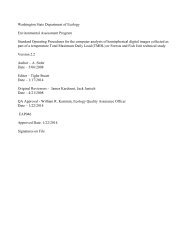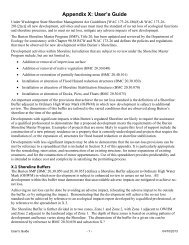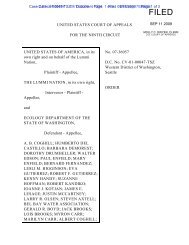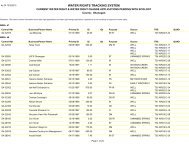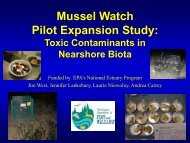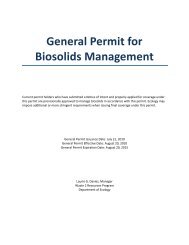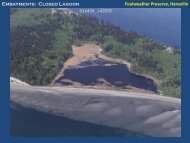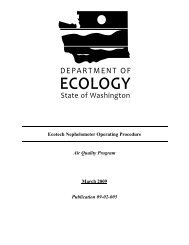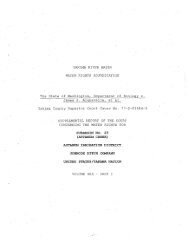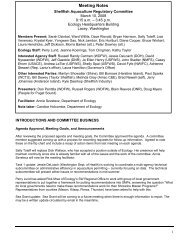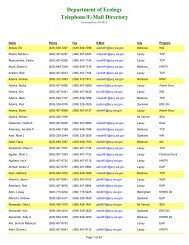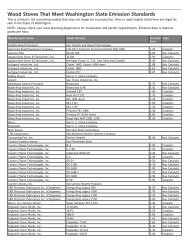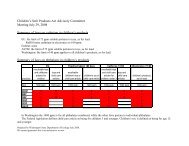WRIA 62 WMP 032305 - Washington State Department of Ecology
WRIA 62 WMP 032305 - Washington State Department of Ecology
WRIA 62 WMP 032305 - Washington State Department of Ecology
Create successful ePaper yourself
Turn your PDF publications into a flip-book with our unique Google optimized e-Paper software.
March, 2005 -91- 023-1289-003.3040<br />
6. Requires the <strong>Department</strong> <strong>of</strong> Health to develop conservation regulations and to adopt<br />
comprehensive rules by December 2005. To fund the development and<br />
implementation <strong>of</strong> the conservation program, the bill allows the <strong>Department</strong> <strong>of</strong><br />
Health to collect additional operating permit fees equivalent to 25 cents per<br />
residential service connection per year through June 2007.<br />
7. Requires the <strong>Department</strong> <strong>of</strong> Health to consult annually with <strong>Ecology</strong>, Fish and<br />
Wildlife, and Community, Trade and Economic Development, regarding<br />
coordination <strong>of</strong> water system plans and watershed plans.<br />
8. Requires watershed implementation plans to address the future use <strong>of</strong> inchoate water<br />
rights.<br />
9. Prioritizes existing instream flow funding to areas where the exercise <strong>of</strong> inchoate<br />
rights may greatly affect streamflows.<br />
10. Clarifies requirements for consideration <strong>of</strong> water reuse when preparing water supply<br />
and wastewater treatment plans.<br />
11. Allows inchoate (authorized but never used) surface water rights to be moved outside<br />
<strong>of</strong> the authorized service area if instream flows are addressed, or in cases <strong>of</strong> public<br />
health emergencies.<br />
12. Authorizes a pilot watershed agreement to allow water right holders to gain<br />
additional flexibility and certainty in exchange for contributin g to watershed<br />
objectives.<br />
5.3.5 Forest Practice Rules and Forest and Fish Report<br />
The 1974 Forest Practices Act (Chapter 76.09 RCW) defines a plan to protect public resources while<br />
assuring that <strong>Washington</strong> continues to be a productive timber growing area. The Act regulates<br />
activities related to growing, harvesting or processing timber on all local government, state and<br />
private forest lands. Practices related to growing, harvesting or processing timber, including, but not<br />
limited to, road construction and maintenance, thinning, salvage, harvesting, reforestation, brush<br />
control, and using fertilizers or pesticides are regulated under the act and its corresponding rules<br />
(Forest Practice Rules, Chapter 222 WAC).<br />
The Forest Practice Rules were updated in 2001 according to needs described in the 1999 Forest and<br />
Fish Report (and are now <strong>of</strong>ten called the “Forest and Fish Rules”). The 1999 Forest and Fish Report<br />
contained recommendations on the development and implementation <strong>of</strong> rules statutes and programs<br />
intended to:<br />
• Provide compliance with the Endangered Species Act for aquatic and riparian-dependent<br />
species on non-federal forest lands;<br />
• Restore and maintain riparian habitat on non-federal forest lands to support a harvestable<br />
supply <strong>of</strong> fish;<br />
• Meet the requirements <strong>of</strong> the Clean Water Act for water quality on non-federal forest<br />
lands; and,<br />
• Keep the timber industry economically viable in the <strong>State</strong> <strong>of</strong> <strong>Washington</strong>.<br />
The 2001 Forest Practice Rules contain directives for adaptive management, road construction and<br />
maintenance, forest practices in aquatic and riparian areas, watershed analysis, and other facets <strong>of</strong><br />
<strong>WRIA</strong> <strong>62</strong> <strong>WMP</strong> <strong>032305</strong>



